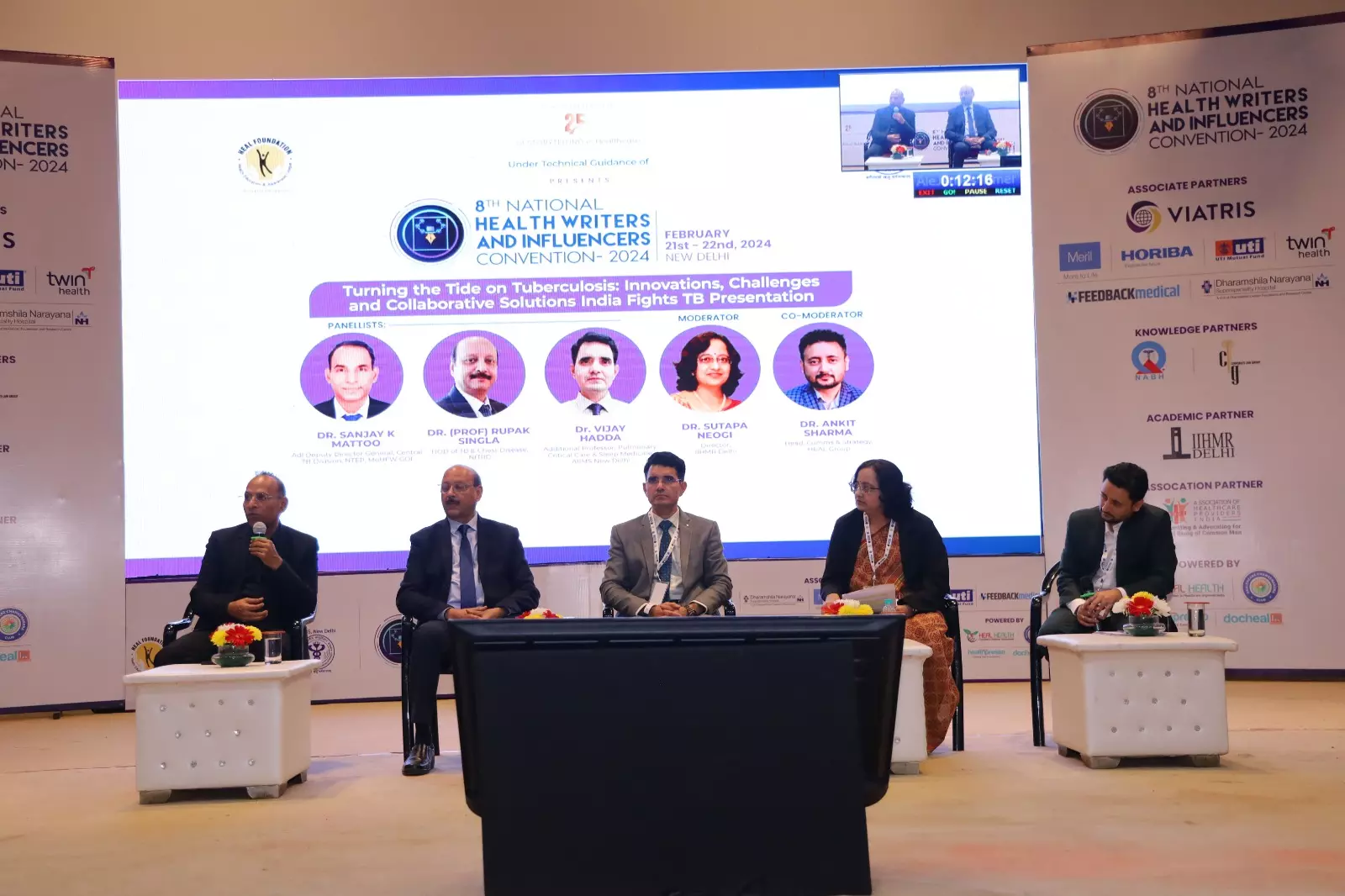TB Cases Reduced at Double Rate in India Through NTEP: Official

Dr Sanjay K Matto, addl deputy director general, Central TB Division, Dr (Prof) Rupak Singla, HOD of TB and Chest Disease, NITRD; Dr Vijay Hadda, additional professor, pulmonary, critical care and sleep medicine, AIIMS, Dr Sutapa Neogi, director, IIHMR Delhi; Dr. Ankit Sharmar, head - strategy, HEAL Group. (DC)
New Delhi: India has accelerated the pace of reduction in the incidence of tuberculosis (TB) cases and related mortality compared to other countries owing to advancement in diagnostics and incentivising reporting disease, said Dr Sanjay K. Matto, additional deputy director general, Central TB Division, the National Tuberculosis Elimination Programme (NTEP).
Speaking at a session, “Turning the tide on tuberculosis: Innovation, Challenges and collaborative solutions India fights TB presentation” at the National Health Writers & Influencers Convention (NHWIC 2024), held recently at the AIIMS in New Delhi, Dr Matto said the NTEP services have reached to a block level in the country.
Matto said India has made significant progress in scaling up molecular diagnostics, providing the most advanced medicines, and implementing the largest digital programme for TB surveillance and monitoring.
He said the NTEP has taken various steps which incentivise and empower TB patients. He said the Aarogya Saathi app provides information and counseling to patients, and the Nikshay Poshan Yojana, which transfers money directly to the patients’ bank accounts.
India is committed to the UN’s Sustainable Development Goals (SDG) target to reduce the TB deaths by 90 per cent by 2030.
Dr (Prof) Rupak Singla, the head of department, TB and Chest Disease, NITRD, said TB can be identified in two hours and also can know the patient's drug resistance or not within one or two days with the latest developments in TB diagnostics in India. He also highlighted the importance of early and accurate diagnosis of TB, the availability of new drug regimens free of injections, and the use of digital technology for TB management.
During a session on “Navigating Medical Ethics in the Current and Future Landscape”, the panelists highlighted the need to follow the National Medical Commission (NMC) guidelines.
Though the guidelines were issued in 2023, they have been kept in abeyance due to legal challenges, to ensure ethical and quality medical practice in India. The NMC guidelines aim to regulate the medical education and profession in India, and mandate the use of generic medicines, which should be at par to the specific drugs in terms of quality and efficacy.
Speaking at a session, “Turning the tide on tuberculosis: Innovation, Challenges and collaborative solutions India fights TB presentation” at the National Health Writers & Influencers Convention (NHWIC 2024), held recently at the AIIMS in New Delhi, Dr Matto said the NTEP services have reached to a block level in the country.
Matto said India has made significant progress in scaling up molecular diagnostics, providing the most advanced medicines, and implementing the largest digital programme for TB surveillance and monitoring.
He said the NTEP has taken various steps which incentivise and empower TB patients. He said the Aarogya Saathi app provides information and counseling to patients, and the Nikshay Poshan Yojana, which transfers money directly to the patients’ bank accounts.
India is committed to the UN’s Sustainable Development Goals (SDG) target to reduce the TB deaths by 90 per cent by 2030.
Dr (Prof) Rupak Singla, the head of department, TB and Chest Disease, NITRD, said TB can be identified in two hours and also can know the patient's drug resistance or not within one or two days with the latest developments in TB diagnostics in India. He also highlighted the importance of early and accurate diagnosis of TB, the availability of new drug regimens free of injections, and the use of digital technology for TB management.
During a session on “Navigating Medical Ethics in the Current and Future Landscape”, the panelists highlighted the need to follow the National Medical Commission (NMC) guidelines.
Though the guidelines were issued in 2023, they have been kept in abeyance due to legal challenges, to ensure ethical and quality medical practice in India. The NMC guidelines aim to regulate the medical education and profession in India, and mandate the use of generic medicines, which should be at par to the specific drugs in terms of quality and efficacy.
( Source : Deccan Chronicle )
Next Story

